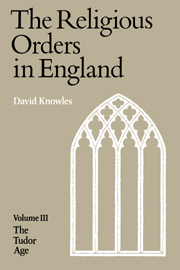Book contents
- Frontmatter
- Contents
- Preface
- List of Abbreviations
- Part One The Tudor Scene
- Part Two The Gathering Storm
- Part Three Suppression and Dissolution
- Part Four Reaction and Survival
- Appendix I Sir Thomas More's letter ‘to a monk’
- Appendix II Religious houses suppressed by Cardinal Wolsey
- Appendix III The witness of the Carthusians
- Appendix IV Houses with incomes exceeding £1000 in the Valor Ecclesiasticus
- Appendix V The sacrist of Beauvale
- Appendix VI Itinerary of the visitors, 1535–6
- Appendix VII The commissioners for the survey of the Lesser Houses in 1536
- Appendix VIII The conflict of evidence on the monasteries
- Appendix IX The last abbots of Colchester, Reading and Glastonbury
- Appendix X Regulars as bishops
- Bibliography
- Index
Appendix III - The witness of the Carthusians
Published online by Cambridge University Press: 08 January 2010
- Frontmatter
- Contents
- Preface
- List of Abbreviations
- Part One The Tudor Scene
- Part Two The Gathering Storm
- Part Three Suppression and Dissolution
- Part Four Reaction and Survival
- Appendix I Sir Thomas More's letter ‘to a monk’
- Appendix II Religious houses suppressed by Cardinal Wolsey
- Appendix III The witness of the Carthusians
- Appendix IV Houses with incomes exceeding £1000 in the Valor Ecclesiasticus
- Appendix V The sacrist of Beauvale
- Appendix VI Itinerary of the visitors, 1535–6
- Appendix VII The commissioners for the survey of the Lesser Houses in 1536
- Appendix VIII The conflict of evidence on the monasteries
- Appendix IX The last abbots of Colchester, Reading and Glastonbury
- Appendix X Regulars as bishops
- Bibliography
- Index
Summary
J. A. Froude, in a justly celebrated passage of his History (II, 350), compares the Carthusians preparing for death to Leonidas and his followers combing their golden hair on the morning of their heroic defence of Thermopylae. The analogy, which Froude proceeds to draw, between those fighting for the political freedom of Hellas and those who died for the freedom of conscience, has appealed to many historians. Whatever may be true of other victims of religious persecution in the sixteenth century, however, it is unhistorical to regard the Carthusians as dying for freedom of belief. They died because they refused to abandon what they were convinced was the secular traditional teaching of the Church, based on the words of Christ. The sources are unanimous on the point.
THE THREE PRIORS
Chauncy, Historia martyrum, 100. When asked by the Council to take the oath of supremacy, they replied: ‘Ecclesiam Catholicam aliter semper tenuisse ac docuisse.’
Ibid. 103. Houghton speaking at Tyburn proclaimed that he died because he refused to obey the king ‘eo quod sancta mater Ecclesia aliter decrevit et statuit quam ipse Rex vester cum suo Parlamento’.
LPVIII, 565 (20 April 1535). Robert Laurence and Augustine Webster are asked by Cromwell ‘whether they…would be content to obey the king as supreme head in earth under Christ of the Church of England? To which both answered they could not consent nor believe that he is so.’
- Type
- Chapter
- Information
- The Religious Orders in England , pp. 471 - 472Publisher: Cambridge University PressPrint publication year: 1979



